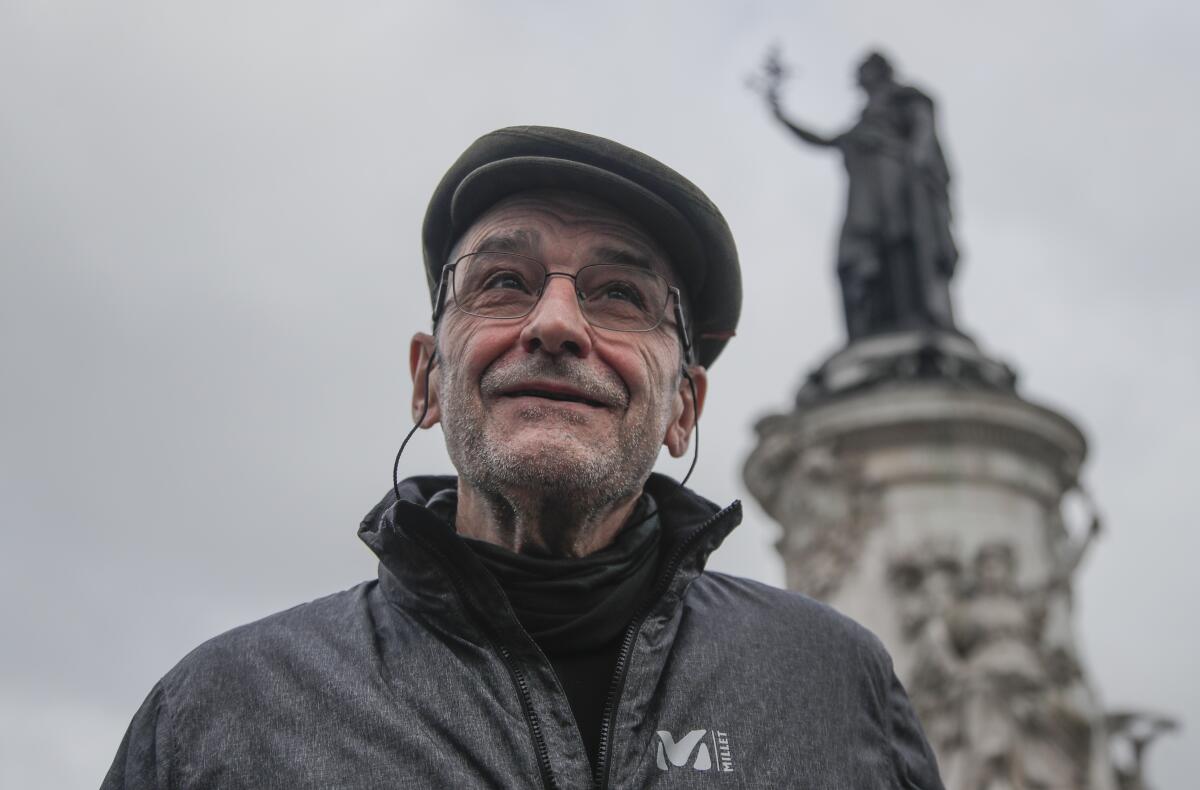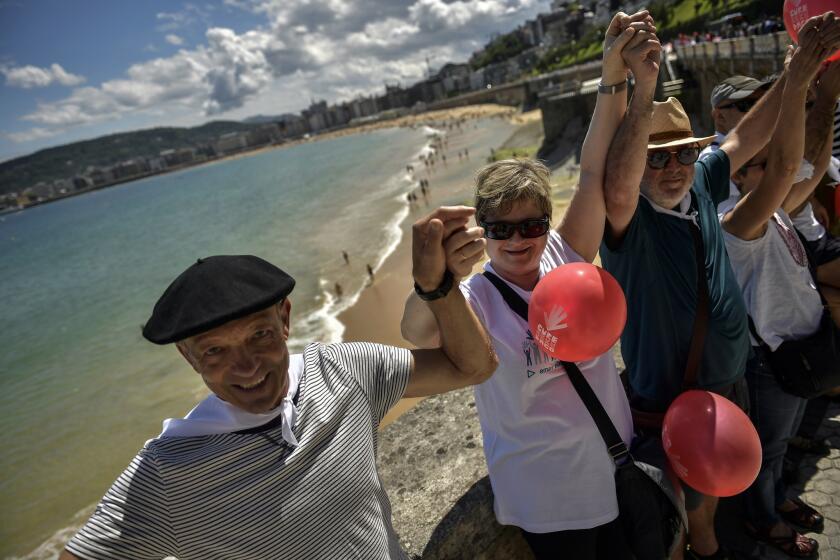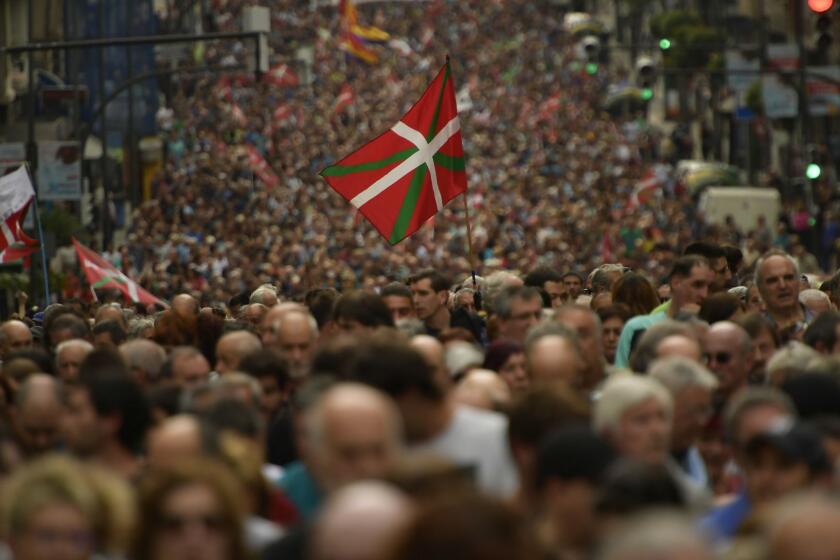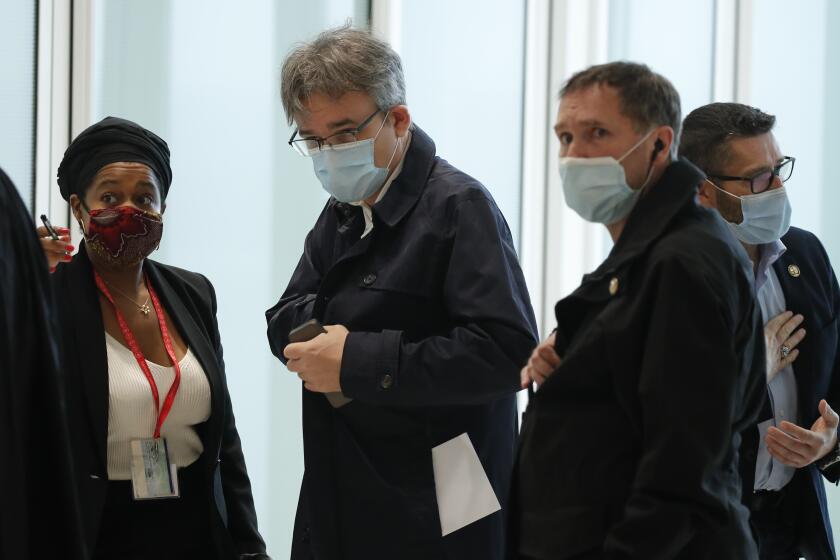Facing terror charges, last boss of Basque militant group ETA apologizes for deaths

- Share via
PARIS — The last-known chief of ETA, the now-extinct Basque militant separatist group, goes on trial Monday in Paris for terrorism charges that he deems “absurd” because of his role in ending a conflict that claimed some 850 lives and terrorized Spain for half a century.
Josu Urrutikoetxea led ETA during one of its bloodiest periods, when its victims included children bombed to death while sleeping in a Zaragoza police compound. In a rare interview after 17 years on the run, he offered an apology, advised other separatist movements against resorting to violence and painted himself as a changed man.
That’s a preposterous claim to those who lost loved ones to ETA’s violence. Just because he oversaw ETA’s end in 2018, they stress, that doesn’t erase his past.
Now 69, diminished by a battle with cancer and facing the possibility of spending the rest of his life behind bars, the man widely known by his police alias, Josu Ternera, says he’s sorry for “irreparable damage” caused by ETA violence. The group sought to build an independent state straddling the Pyrenees mountain range between Spain and France.
Asked if he would apologize to ETA victims’ families, he told the Associated Press: “Of course, [I offer] apologies for something that we can’t repair.”
But he insisted that the Basque independence movement had suffered, too, driven into a “black hole” of cultural repression whose roots lie in the Fascist dictatorship that ended more than four decades ago.
It seemed like the launch of another secessionist drive in Spain: Tens of thousands of people linked hands across Basque Country this month — forming a human chain that stretched 124 miles from the coastal town of San Sebastian to its capital, Vitoria — to demand a referendum on the region’s political future.
Apologies aren’t enough for some ETA victims.
“I don’t seek revenge against Josu Ternera,” said Lucía Ruiz, who was 10 when she was injured in the 1987 blast targeting military police barracks in Zaragoza. “But this gentleman tried to kill me, and I want for him to pay a price for it.”
Since his long-awaited arrest last year, Urrutikoetxea has campaigned to shed the terrorist label and rebrand himself as a repentant, aging peacemaker.
He won conditional release in July pending trial after his lawyers argued that poor health made him vulnerable to the coronavirus. He’s now staying with a friend in Paris, where he’s trying to get his first-ever college diploma and is allowed out a few hours a day with an electronic-monitoring bracelet.
Spain’s government vowed Wednesday to press criminal investigations of the militant group ETA regardless of the group’s dissolution ending a bloody 60-year campaign for a Basque nation independent of Spain and France.
In a petition published Saturday, more than 250 intellectuals from multiple countries called for France and Spain to end Urrutikoetxea’s prosecution, arguing that putting him on trial “is implicitly criminalizing all negotiators and calling into question all current and future peace processes in the world.”
Those calls are rejected by most of Spain’s political mainstream.
Ruiz and Spanish authorities believe that Urrutikoetxea, as ETA’s leader, either approved or knew about the dynamite-packed car that exploded under her window at the Zaragoza Civil Guard headquarters, where Ruiz was living with her parents and sister.
Three ETA members were tried and imprisoned for carrying out the attack, which killed 11 people, including six children.
“He now presents himself as the country’s savior,” Ruiz said. “But this gentleman is a murderer, with murder written in capital letters.”
Urrutikoetxea denies any role, saying: “They want me to answer for something I had nothing to do with.”
His life mirrors the trajectory of ETA, whose initials stand for “Basque Homeland and Freedom” in the Basque language.
The group sprang up during Gen. Francisco Franco’s 1939-1975 dictatorship. Urrutikoetxea joined in 1968, the year of ETA’s first deadly attack, and led the group in the late 1980s. He served 11 years in French and Spanish prisons, was a lawmaker in the Basque regional parliament and then a negotiator in talks with Spanish government envoys.
News Alerts
Get breaking news, investigations, analysis and more signature journalism from the Los Angeles Times in your inbox.
You may occasionally receive promotional content from the Los Angeles Times.
Urrutikoetxea claims that he was under quiet French police protection for years, which allowed him to travel to peace talks despite being on Interpol’s most-wanted list. The French government would not comment on his assertion.
ETA gave up arms in 2017, and Urrutikoetxea announced the final dismantling of ETA the following year.
“We had to ... open the path to peace, whatever it cost,” he said, “for the generations to come.”
He’s facing justice this week for the first time in decades, in two back-to-back Paris trials where he is charged with “criminal association with a view to preparing a terrorist act,” for alleged attack plots in the 2000s and 2010s.
The French satirical paper whose Paris offices were attacked by Islamic extremists is republishing controversial caricatures of the prophet Muhammad.
He was already convicted in absentia in both cases and sentenced to 15 years total in prison, but he asked after his arrest to be retried in person. Arguing that he was focused on peace efforts at the time of the alleged plots, he said it was “absurd that they want to judge me” for this.
His lawyer plans to request a delay to Monday’s trial for procedural reasons. Once the French trials end, France has agreed to extradite Urrutikoetxea to Spain, which wants to try him for crimes against humanity, multiple killings and belonging to a terrorist organization, although his defense has appealed.
Basque society remains divided, said Gaizka Fernández Soldevilla, a historian and researcher with the Foundation and Memorial for Terrorism Victims in the Basque region’s capital, Vitoria.
“There is a part that wants to turn the page without having read it, and there is another side that wants to get a lesson for democracy out of it ... to try to heal the wounds and become a more coherent, cohesive society,” Fernández said.
But that won’t happen, Fernández added, “if all that’s done is to try to forget.”
More to Read
Sign up for Essential California
The most important California stories and recommendations in your inbox every morning.
You may occasionally receive promotional content from the Los Angeles Times.
















